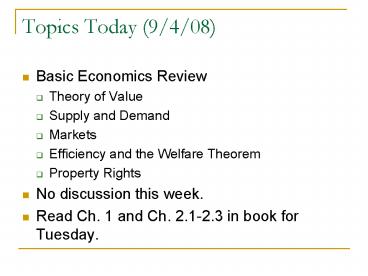Topics Today 9408 PowerPoint PPT Presentation
1 / 32
Title: Topics Today 9408
1
Topics Today (9/4/08)
- Basic Economics Review
- Theory of Value
- Supply and Demand
- Markets
- Efficiency and the Welfare Theorem
- Property Rights
- No discussion this week.
- Read Ch. 1 and Ch. 2.1-2.3 in book for Tuesday.
2
Theory of Value
- Q Which commodity is more valuable, water or
diamonds? - Paradox
- Useful items gt low prices
- Non-essential items gt high prices
3
Theory of Value
- Production cost (Ricardo early 1800s)
- Value is driven by production cost.
- Counter example
- Cost to catch a Golden Gopher 1 hour of labor
- Cost to catch a Badger 3 hours of labor
- 1 Badger would exchange for 3 Golden Gophers
- But who in Madison wants a Golden Gopher?
- This explanation doesnt account for demand.
4
Theory of Value
- Marginalist Principle (late 1800s)
- Total usefulness ? gt value.
- Usefulness of the last unit consumed gt value.
- Water gt plentiful gt low marginal value.
- Diamonds gt scarce gt high marginal value.
- Marginal Willingness to Pay (MWTP) the most a
person is willing to pay for the last unit of a
good.
5
Demand
- Ex/ Demand for Badger Football tickets
6
Demand
7
Demand
- If price 70 how many tickets are purchased?
- If price 25 how many tickets are purchased?
- Decisions made on a unit-by-unit (marginal) basis.
8
Demand
- How much would individual pay for 5 tickets?
- 5040302010150
- This is total willingness to pay.
9
Demand
- If price 25, would individual buy 5 tickets?
- 25x5125.
- TWTP for 5 tickets is 150.
- Individual would not buy 5 tickets. Why?
- Price gt MWTP for the 4th and 5th units.
- Decisions made on a marginal basis.
10
Demand
- Consumer Surplus the difference between how much
an individual (or individuals) is willing to pay
and how much they have to pay.
11
Demand
If price 25, Consumer Surplus (50-25)
(40-25) (30-25) 45
12
Demand
- Demand curve - a schedule that tells us how many
units of a good an individual (or a group of
individuals) will purchase at a given price. - A point on the demand curve indicates MWTP for a
particular unit.
13
Market Demand
3
3
3
Q
39
74
Q
Q
35
Individual 1
Individual 2
Market
14
Shifts in Demand
- Factors causing a shift in the demand curve
- Size of market
- Tastes and preferences
- Income
- Price of related goods
- Expectations
D1
D0
D2
Q
15
Supply
- Marginal cost (MC) how much it costs a firm to
produce the last unit of a good.
16
Supply
- Ex/ Supply for Badger Football tickets
17
Supply
18
Supply
- Ex/ Supply for Badger Football tickets
- If price 5, how many units will be sold?
- If price 25, how many units will be sold?
- Seller makes decisions on a unit-by-unit
(marginal) basis.
19
Supply
- Producer surplusthe difference between how much
a firm (or firms) receives for its good and how
much it costs the firm to produce it.
20
Supply
If price 25, Producer Surplus (25-0)
(25-10) (25-20) 45
21
Supply
- Supply curve - a schedule that tells us how many
units of a good an individual (or firm) will sell
at a given price. - A point on the supply curve indicates the
marginal cost for producing a particular unit.
Q
22
Market Supply
3
3
3
Q
39
74
Q
Q
35
Firm 1
Firm 2
Market
23
Shifts in Supply
- Factors causing a shift in the supply curve
- Seller Numbers.
- Resource prices (e.g. price of labor).
- Technology.
- Price expectations.
S1
S0
S2
Q
24
Competitive Market Equilibrium
- Competitive market equilibrium the price and
quantity of a good that equates demand and
supply.
25
Competitive Market Equilibrium
- How many units will be sold?
- 3
- Why? MWTP gt MC on units 1 through 3.
26
Competitive Market Equilibrium
- What is equilibrium price (p)?
- Between 20 and 30.
- Why? Because MCltpltMWTP.
- Assume that p25.
27
Competitive Market Equilibrium
MC
P
MWTP
Q
Q
28
Competitive Market Equilibrium
- Competitive means that there are lots of buyers
and sellers of the good, implying no single firm
or consumer can influence the price. - Markets are institutions through which voluntary
exchange of scarce resources take place. - Equilibrium means there are no forces acting to
change the price and quantity.
29
Efficiency
- An allocation of resources is efficient if it is
not possible to reallocate resources without
making at least one person worse off. - Ex/ Suppose only two Badger tickets were sold.
Then both the buyer and seller are worse off than
the competitive equilibrium. Why? - Because they could both be better off by trading
for the 3rd ticket. - MWTP gt MC for the 3rd ticket.
30
Welfare Theorem
- A competitive market will result in an efficient
allocation of resources, provided the following
assumptions hold - Property rights to resources are well-defined.
- Information between buyers and sellers is
complete.
31
Property Rights
- Property rights a bundle of entitlements,
privileges, and limitations defining the owners
rights to use a resource. - Assignment through laws
- Enforcement through courts
32
Property Rights
- A system of well-defined property rights has the
following four characteristics - Comprehensive all resources are owned, all
entitlements defined. - Exclusive all benefits and costs from use of a
resource accrue to the owner. - Transferable property right is transferable
through voluntary exchange. - Secure property right is secure from
involuntary seizure by others.
See page 14 in your book

